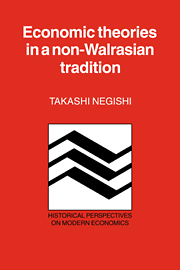Book contents
- Frontmatter
- Contents
- Preface
- 1 Anti-neoclassical or non-Walrasian economic theories
- Part I Increasing returns and diminishing cost
- 2 Adam Smith and increasing returns in a competitive situation
- 3 A reconstruction of Smith's doctrine on the natural order of investment
- 4 The possibility of a falling rate of profit under diminishing cost
- 5 Rehabilitation of Marshall's life-cycle theory to explain diminishing cost
- Part II Wages and profit
- Part III International trade and investment
- Part IV Markets and money
- Notes
- References
- Author index
- Subject index
4 - The possibility of a falling rate of profit under diminishing cost
from Part I - Increasing returns and diminishing cost
Published online by Cambridge University Press: 21 September 2009
- Frontmatter
- Contents
- Preface
- 1 Anti-neoclassical or non-Walrasian economic theories
- Part I Increasing returns and diminishing cost
- 2 Adam Smith and increasing returns in a competitive situation
- 3 A reconstruction of Smith's doctrine on the natural order of investment
- 4 The possibility of a falling rate of profit under diminishing cost
- 5 Rehabilitation of Marshall's life-cycle theory to explain diminishing cost
- Part II Wages and profit
- Part III International trade and investment
- Part IV Markets and money
- Notes
- References
- Author index
- Subject index
Summary
The truth of Marx's law of the falling rate of profit due to a rising organic composition of capital seems to be denied by the Shibata–Okishio theorem, which states that the technical innovations to be adopted by the capitalists do not reduce the general rate of profit. Even if it is true that a technical invention with rising organic composition implies falling rate of profit, it is impossible to see it realized, because such an invention would never be adopted by profit-maximizing capitalists. Okishio tried to salvage Marx's law by arguing that the organic composition rises and the rate of profit falls if the rate of real wage rises. As is pointed out by Shaikh and was, of course, admitted by Okishio, however, Marx presented a rising organic composition as a technical cause of a falling rate of profit, rather than as an economic effect of an already fallen rate of profit occasioned by rising wages. If wages first rose, the effect of the adoption of a technique with higher organic composition would not be to reduce the rate of profit further, but to mitigate the effect of a higher rate of wages.
The Shibata–Okishio theorem, like other recent Marxist theorems after Sraffa, was developed under the assumption of constant cost (returns to scale) and perfect competition in the neoclassical sense, according to which firms face infinitely elastic demand curves.
- Type
- Chapter
- Information
- Economic Theories in a Non-Walrasian Tradition , pp. 35 - 44Publisher: Cambridge University PressPrint publication year: 1985



